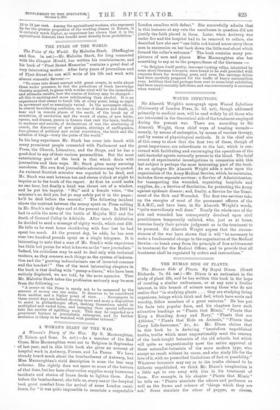WOUND INFECTIONS.
Sir Almrotb Wright's monograph upon Wound Infections (University of London Press, 2s. 6d. net), though addressed primarily to medical men, will be read widely by all those who are interested in the theoretical side of the treatment employed during the present war. There are, according to Sir Alinroth Wright, three chief ways of treating wounds— namely, by means of antiseptics, by means of vaccine therapy, and by means of physiological methods. It is the chief aim of this essay to show that the first two Of these, though of great importance, are subordinate to the last, which is con- cerned with facilitating and encouraging the operations of the anti-bacterial agents naturally present in the blood. The brief record of experimental investigations in connexion with this last subject is perhaps the most interesting part of the book. As an epilogue Sir Altnroth Wright adds a note upon the organization of the Army Medical Service, which, he maintains, includes three separate services: a Service of Administration, for transporting the wounded, organizing hospitals and supplies, &c.; a Service of Sanitation, for protecting the Army against epidemic disease; and, finally, a Service for the Treat- ment of the Sick and Wounded. The first two services take up the energies of most of the permanent officers of the R.A.31.0., and have been, in Sir Almroth Wright's words, "quite marvellously well done." Nearly the whole care of the sick and wouhded has consequently devolved upon civil practitioners temporarily enlisted, who, just as at home, exercise freely their private judgment as to the treatment to be pursued. Sir Ahttroth Wright argues that the circum- stances of the war have shown that it will "be necessary to make a fundamental change in the organization of the Medical Service—to break away from the principle of free arbitrament in treatment for the Medical Officer, and to provide that all treatment shall be regulated by orders and instructions."














































 Previous page
Previous page